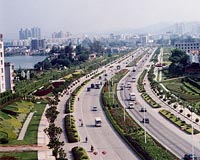 |
Brussels, Belgium (SPX) Sep 28, 2010 EUREKA project E! 4104 ECOPROMAT has developed a novel and environmentally-friendly type of matting for use in protection against the spread of contagious animal diseases such as avian influenza, and for routine hygiene in animal and food production. Soaked with disinfectant solution, the matting can be used for disinfecting vehicle tyres, and the shoes and boots of personnel. As it is made of 100% natural fibres, it is highly absorbent to disinfectant solution; it is also fully biodegradable and therefore avoids the high disposal costs of synthetic alternatives. The under-surface is made of densely woven fabric for strength, and impregnated with natural resin to prevent seepage of disinfectant into the ground, or dilution of disinfectant by ground water. Outbreaks of contagious animal diseases like avian flu, foot-and-mouth disease and bovine spongiform encephalopathy (BSE), cause national and regional public health authorities take extensive steps to prevent these diseases from spreading. The economic costs of such outbreaks are hard to estimate, but they can cause major disruption to agricultural production and food distribution, also environmental challenges in disposal of infected animals and contaminated materials; plus widespread public anxiety.
Stopping the spread of disease The various methods in use until now all have disadvantages. Requiring people and vehicles to pass through a shallow bath of disinfectant solution or a trough of sawdust or wood chips soaked in disinfectant is cumbersome, costly and requires labour for replacement. Another approach is a mat with an outer polyester layer, an absorbent layer made of polyurethane and a third PVC layer to prevent disinfectant from penetrating into the ground; or a nylon fibre mat backed with nitrile rubber. However the raw materials used in those mats make disposal difficult and costly, requiring special treatment plants for degradation.
Natural fibres are the solution The central layer of the mat is highly absorbent, non-woven material which is significantly more hygroscopic than the synthetic alternative. The upper layer is woven, needle-punched jute fabric, which is protective and durable to protect the central reservoir from pressure e.g. from vehicles driven over it. Dr Jerzy Mankowski of the Polish Institute of Natural Fibres and Medicinal Plants explains that unlike the synthetic alternatives, matting made of flax and hemp fibres is completely biodegradable and environmentally friendly. The Institute of Natural Fibres, which led the ECOPROMAT project, was partnered by the German company, Bioformtex from Zehdenik. The main task of the Institute was to develop the three-layer non-woven product with appropriate strength, thickness and weight, to allow for proper absorption of disinfectant solution but not allowing penetration of the disinfectant into the ground. Various combinations of flax and hemp were tested to determine the mechanical and needling parameters affecting the tensile strength and recovery potential; to determine the most suitable and cost-effective textile material for the lowest layer. Bioformtex developed the dense, non-woven central layer and the needle-punched jute upper layer. It also investigated the addition of disinfectant in powder form to the nonwoven layer during production, and developed composting accelerators to aid degradation of the natural resin in the matting.
Into production The matting is covered by Polish and European patents, and is being used in poultry, pig and cattle production units, dairies, meat processing plants and slaughterhouses, apiaries, and food processing areas. It is also used for more general antibacterial hygiene, e.g. mushroom-growing cellars and greenhouses; agricultural research centres, border crossings and quarantine areas. The initial cost of the new matting is low - between euros 10-12 per square metre, which is a significant saving on synthetic matting at euros 15-20 per square metre. Cost saving also results from the biodegradability of the new natural-fibre matting, which means that contaminated matting can be disposed of much more readily and cheaply than the synthetic alternatives.
Prizewinning innovation
Share This Article With Planet Earth
Related Links EUREKA project E! Farming Today - Suppliers and Technology
 China announces rules to curb land hoarding
China announces rules to curb land hoardingShanghai (AFP) Sept 27, 2010 China on Monday unveiled new rules to curb land hoarding by developers, its latest efforts to pop a feared speculative bubble in the nation's soaring real estate sector. Developers will be banned from bidding for more properties if they have lands idle for more than a year, illegally transferred lands, or developed land in breach of agreements, two Chinese ministries said. Local governme ... read more |
|
| The content herein, unless otherwise known to be public domain, are Copyright 1995-2010 - SpaceDaily. AFP and UPI Wire Stories are copyright Agence France-Presse and United Press International. ESA Portal Reports are copyright European Space Agency. All NASA sourced material is public domain. Additional copyrights may apply in whole or part to other bona fide parties. Advertising does not imply endorsement,agreement or approval of any opinions, statements or information provided by SpaceDaily on any Web page published or hosted by SpaceDaily. Privacy Statement |